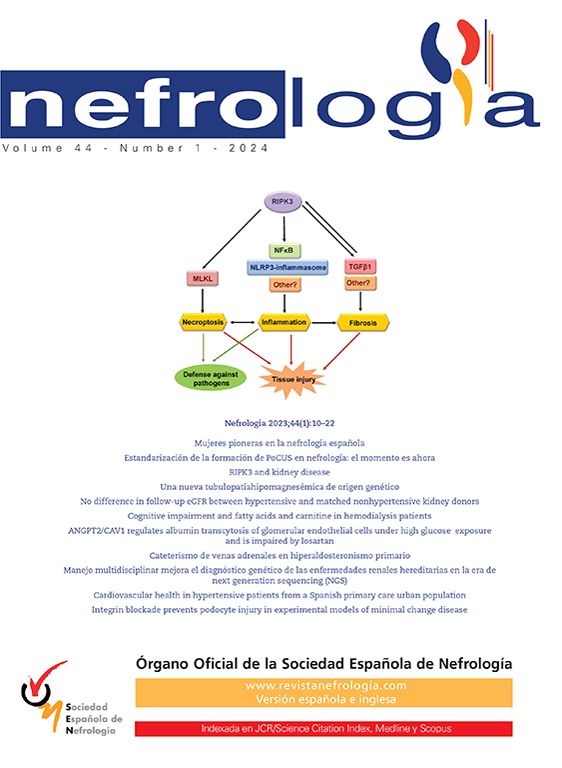To the Editor,
We read the article by Pérez de José et al. recently published in Nefrología1 with great interest. In this study, the authors referred to both the prevalence of metabolic syndrome (MS) and its association with the greater presence of cardiovascular events in the haemodialysis (HD) population.
We had previously reported a study on the prevalence, clinical characteristics and biochemical parameters of MS according to the criteria of the National Cholesterol Education Program (NCEP)-Adult Treatment Panel (ATP III) in our HD unit2. We carried out a descriptive analysis of 55 patients, comparing those diagnosed with MS (23 patients) with the rest of the patients in our HD unit. Patients with MS had a mean age of 70.9±12.5 years and had been on HD for 35.8±38.5 months. The mean Charlson index was 10.5±2.2 and the main aetiology of kidney disease was diabetes mellitus (39%). Its main traditional risk factors were high blood pressure (90%) and diabetes mellitus (76%). In the diagnosis of MS, 80% had impaired glucose, 85% had impaired HDL-cholesterol, 65% had hypertriglyceridaemia, 56% had abdominal obesity and 53% had high blood pressure. The prevalence of MS was 42% (47% males). We did not find differences between groups in relation to sex or primary kidney disease, although patients with MS had a larger abdominal girth (105.7±14.1 vs. 96.1±11.8) and a shorter time on HD (35.8±38.5 vs. 82.6±105.8 months). Likewise, we did not observe differences in biochemical parameters (haemoglobin, fibrinogen, C-reactive protein, glucose, calcium, phosphorus, intact parathyroid hormone, uric acid and lipid profile). Compared with the non-MS patients, those with MS had higher atrial fibrillation (16% vs. 8%), left ventricular mass index (75% vs. 68%) and diastolic dysfunction parameters (42% vs. 30%) estimated using eco-Doppler. The presence of cardiovascular events was higher in patients with MS (53% vs. 44%), mainly due to ischaemic heart disease (21% vs. 6%) and peripheral heart disease (26% vs. 15%). Likewise, patients with MS had more days of hospitalisation (44.5 vs. 23.2 days mean/patient). We additionally analysed the treatment prescribed to our patients intended for controlling cardiovascular risk factors (MS vs. non-MS): antiplatelet therapy (65% vs. 46%), statins (50% vs. 31%) allopurinol (13% vs. 3%), angiotensin-converting-enzyme inhibitors or angiotensin receptor blockers (43% vs. 32%), beta-blockers (46% vs. 34%), calcium channel blockers (30% vs. 22%).
Similarly to this study and those previously published in the literature3-5, we observed a high prevalence of MS in patients in our study, although the differences observed may have been linked to their demographic characteristics (older and with greater comorbidity) and the high presence of associated risk factors. Likewise, our patients with MS had greater comorbidity and cardiovascular events, resulting in longer hospitalisation. In our study, we did not observe differences in biochemical or inflammation data; however, the worse functional and structural cardiac impairment of patients with MS could in part explain the greater presence of cardiovascular events and comorbidity in them.
The aim of our comment is to re-affirm the high prevalence of MS in patients on HD, as well as expressing our opinion in relation to performing dysthanasia, with the aim of reducing their high cardiovascular morbidity and mortality. Moreover, we agree with the authors about the need for studies with a higher number of patients and a longer follow-up period in order to establish definitive conclusions about morbidity and mortality of MS in HD patients.
Conflicts of interest
The authors declare that they have no conflicts of interest related to the contents of this article.





